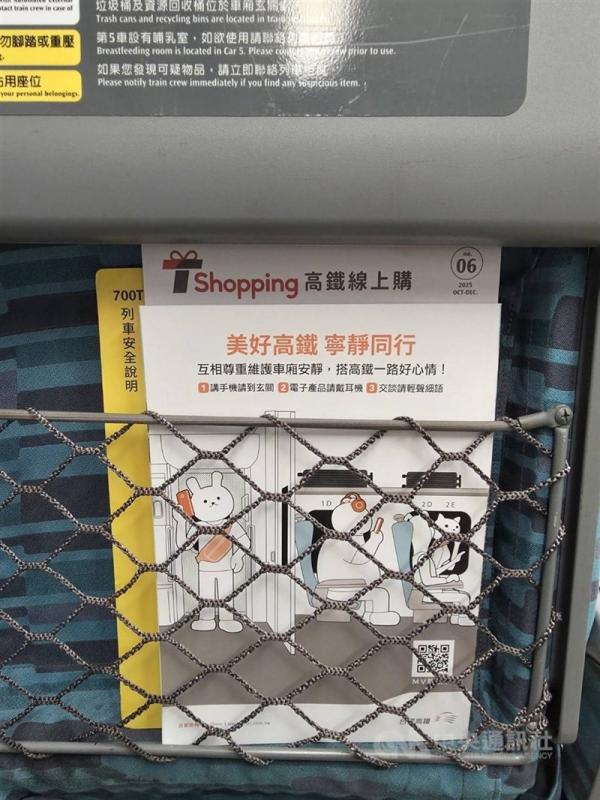Taiwan High Speed Rail (THSR) said yesterday it was still committed to making all carriages on its trains "quiet" but that it had adjusted its enforcement approach following complaints that this policy was unfriendly toward children.
The company said it replaced seat pocket cards that read "quiet space," and stopped sending staff to tell passengers to keep quiet starting Sunday.

Photo courtesy of Taiwan High Speed Rail
New seat cards now feature graphics reminding passengers to use headphones, make phone calls in the vestibule, and have conversations at a low volume.
THSR reiterated that the policy, launched on Sept. 22, targets passengers who disregard these rules rather than children.
It added that it would continue promoting the rules, citing a recent survey showing "broad support" from passengers.
THSR's new policy has drawn criticism after being perceived as pressuring families to keep their children quiet.
One social media post recounted an incident in which a mother traveling with two young children was shown a sign by staff asking her to lower her children's voices.
At a press conference today, New Power Party Chairwoman Claire Wang (王婉諭) said THSR's policy should emphasize good manners when using electronic devices instead of silence.
Taiwan Statebuilding Party's Wu Hsin-tai (吳欣岱) added that if THSR insists on enforcing the policy, it should designate certain cars instead of the whole train as quiet zones while also fostering a child-friendly atmosphere.
Meanwhile, Health Minister Shih Chung-liang (石崇良) said yesterday that the Ministry of Health and Welfare (MOHW) is seeking a "more flexible solution" with other agencies within a month.
As the authority overseeing the Child and Juvenile Welfare and Rights Protection Act, Shih said the MOHW does not oppose the policy but urged the company to consider child-friendliness in its implementation.

The manufacture of the remaining 28 M1A2T Abrams tanks Taiwan purchased from the US has recently been completed, and they are expected to be delivered within the next one to two months, a source said yesterday. The Ministry of National Defense is arranging cargo ships to transport the tanks to Taiwan as soon as possible, said the source, who is familiar with the matter. The estimated arrival time ranges from late this month to early next month, the source said. The 28 Abrams tanks make up the third and final batch of a total of 108 tanks, valued at about NT$40.5 billion

Two Taiwanese prosecutors were questioned by Chinese security personnel at their hotel during a trip to China’s Henan Province this month, the Mainland Affairs Council (MAC) said yesterday. The officers had personal information on the prosecutors, including “when they were assigned to their posts, their work locations and job titles,” MAC Deputy Minister and spokesman Liang Wen-chieh (梁文傑) said. On top of asking about their agencies and positions, the officers also questioned the prosecutors about the Cross-Strait Joint Crime-Fighting and Judicial Mutual Assistance Agreement, a pact that serves as the framework for Taiwan-China cooperation on combating crime and providing judicial assistance, Liang

A group from the Taiwanese Designers in Australia association yesterday represented Taiwan at the Midsumma Pride March in Melbourne. The march, held in the St. Kilda suburb, is the city’s largest LGBTQIA+ parade and the flagship event of the annual Midsumma Festival. It attracted more than 45,000 spectators who supported the 400 groups and 10,000 marchers that participated this year, the association said. Taiwanese Designers said they organized a team to march for Taiwan this year, joining politicians, government agencies, professionals and community organizations in showing support for LGBTQIA+ people and diverse communities. As the first country in Asia to legalize same-sex

MOTIVES QUESTIONED The PLA considers Xi’s policies toward Taiwan to be driven by personal considerations rather than military assessment, the Epoch Times reports Chinese President Xi Jinping’s (習近平) latest purge of the Chinese People’s Liberation Army (PLA) leadership might have been prompted by the military’s opposition to plans of invading Taiwan, the Epoch Times said. The Chinese military opposes waging war against Taiwan by a large consensus, putting it at odds with Xi’s vision, the Falun Gong-affiliated daily said in a report on Thursday, citing anonymous sources with insight into the PLA’s inner workings. The opposition is not the opinion of a few generals, but a widely shared view among the PLA cadre, the Epoch Times cited them as saying. “Chinese forces know full well that